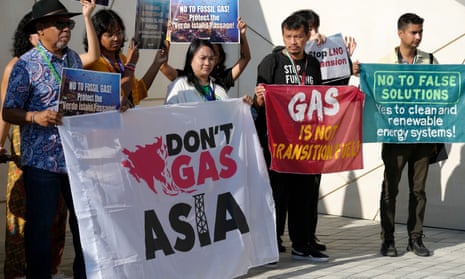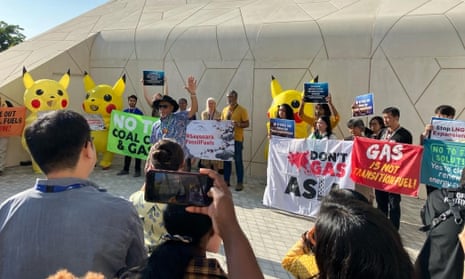Cop28: backlash after president claims ‘no science’ behind fossil fuel phase-out – live | Cop28
Key events
A timely new report is out today. While the CEO of ExxonMobil was complaining this weekend that Cop28 does not focus enough on carbon capture and storage, research shows that a high Carbon Capture and Storage (CCS) pathway to net zero emissions in 2050 is expected to cost at least $30 trillion more than a low CCS pathway – roughly $1 trillion per year.
Oil and gas companies hope that CCS can keep their operations going for longer and at a larger scale, but the scientific community has cast doubts on whether it can be used at scale, beyond the heavy industries it is very difficult to decarbonise.
CCS is set to feature prominently at the summit this week, with major oil and gas producing countries expected to unveil shared carbon storage goals.
The analysis from the Smith School at the University of Oxford has found rolling out CCS throughout the economy, rather than just in a handful of essential sectors, makes little sense from a financial perspective.
“Relying on mass deployment of CCS to facilitate high ongoing use of fossil fuels would cost society around a trillion dollars extra each year – it would be highly economically damaging,” says Dr Rupert Way, Honorary Research Associate at the Oxford Smith School.
Nina Lakhani
The United Arab Emirates’ vast fossil fuel production is contributing to dangerously high air pollution levels, creating health risks for its people and migrant workers in addition to heating the planet, according to a report by Human Rights Watch.
HRW analysis of data from 30 government ground monitoring stations in September 2023 found that average levels of PM2.5 (very small toxic particles that can penetrate deep into the lungs and easily enter the bloodstream) were almost three times the daily recommended levels under the World Health Organization’s air quality guidelines.
An estimated 1,872 people a year die from outdoor air pollution in the UAE, where migrants account for 88% of the population and virtually all outdoor workers, who face the highest risks. The sky has been hazy with pollution on most days since thousands of delegates descended on Dubai for Cop28, with daily air quality readings up to five times above the WHO’s air quality recommendations.
Read more below.
John Kerry, the US special envoy for climate was just asked on the BBC Radio 4 Today programme in the UK what he thinks of Damian Carrington’s scoop that Sultan Al Jaber said there was ‘no science’ behind demands for phase-out of fossil fuels.
He was very diplomatic in his response and appeared to give the oil chief and Cop28 president the benefit of the doubt.

“Well I think what he was saying … is the science itself does not prescribe a particular approach, it doesn’t say you have to do this or you have to do that,” Kerry explained.
“What you have to do is clearly reduce the emissions. They have made it clear we need a 43% minimum reduction in emissions by 2030, and we need net zero 2050 in order to meet the goal of keeping 1.5. We’ve got all kinds of ways of getting there. Renewables are the one technology we really know we can deploy today and it has the impact we need.”
He then spent some time talking about the US climate goals and that they are signed up to phase out fossil fuels.
“We are not only signed up to that, president Biden on behalf of the US voted to join the g7 where we said we must phase out unabated fossil fuel. We have to do that yes otherwise you cannot reach net zero by 2050. What we are trying to figure out is how we can capture those emissions, or reduce those emissions, or not make those emissions in the first place.
“I think the only question here is not whether or not you are going to reduce emissions, it’s what means are you going to use to go at this to provide the energy you want for your country but also keeping faith with the reduction of the emissions that are creating the climate crisis.”
Women’s rights organisations are being shut out of climate finance, a new report by CARE International UK has found.
Launched to coincide with Finance and Gender Day, the study shows that women’s rights organisations received less than 0.2% of UK bilateral climate finance in 2022. Even though the impacts of climate breakdown are linked to gender inequality, less than 1% of UK bilateral climate finance targeted gender equality specifically last year.
Perhaps it is no coincidence that only 38% of registered delegates at Cop28 are women, an increase of 1% compared to Cop27 – historically negotiations have been very male-dominated, allowing gender inequality to be sidelined. Of the 133 world leaders attending COP28, just 15 were women.
Stephanie Akrumah, a climate activist and Director of the Centre for Green Growth, a Ghana based NGO, said:
“Women and girls should be at the centre of tackling the climate crisis but instead, our voices are silenced and we are ignored when funding is distributed. Conscious and unconscious barriers holding women back must be demolished. We are losing our lives and livelihoods due to climate change caused by rich countries and corporations. It is time for Rishi Sunak and other world leaders to listen and support women and girls.”
Here is some further reading on gender and climate.
Our leader column today calls for a “green Marshall plan” to phase out fossil fuels for good.
It says that it is “crazy” that governments plan to produce more than double the amount of fossil fuels in 2030 that is consistent with a “safe” global temperature rise of 1.5C.
Indeed, the 2015 Paris agreement does not mention fossil fuels as responsible for global heating, so countries can both sign up to meet 1.5C while rolling out new oil and gas exploration contracts.
It points out that although Colombia’s economy is dependent on fossil fuels, which account for about half of its exports, its president has committed to stop the expansion of coal, oil and gas exploitation. If they can do it, why can’t we?
Read more below.
New Zealand has won an award at Cop28. Unfortunately it is not one to be proud of. Each day, the Climate Action Network is branding one country the “fossil of the day” – an award for the most bone-headed and regressive climate action.
Yesterday, it was given to New Zealand because of the newly-formed government’s choice to overturn the existing world-leading ban on new oil and gas exploration. Christopher Luxon, the new prime minister, has vowed to open the country’s vast ocean to more oil and gas exploration, rowing back on his predecessor Jacinda Ardern’s 2018 ban.
Climate Action Network says:
“Does climate change minister Simon Watts not hear the climate alarm bells ringing? He may underestimate the devastating climate consequences of this decision but we, and their Pacific island neighbours in Palau, who slammed his intentions as ‘TRAGIC’, certainly do not.
“Minister Watts may be new to his role but we remember the decade-long campaign led by Indigenous Māori communities who succeeded in achieving a ban on oil and gas exploration in New Zealand’s oceans. Not only does Watts and the rest of the New Zealand government want to remove the country’s legacy of climate leadership but they also seek to redefine legislative interpretation of the country’s founding treaty with Māori communities, to reassess Treaty-based policies, and to roll back official use of Māori language – undoing the progress made between Māori and government relationships.”
Most of the world does not have fossil fuel phase out plan – report
A new report has found that global net zero targets are at risk because the majority of countries have not set proper targets to stop using fossil fuels.
Net Zero Tracker has today released the stark data showing the chasm between global net zero targets and the action needed to make them happen. It has found that net zero targets cover 88% of global GHG emissions, but only 7% of those emissions are covered by any kind of national commitment to phase-out exploration, production or use of coal, oil or gas. In total, 13% have pledged a full phase-out of any fossil fuel.

The report says that 94% of oil-producing countries have not set an oil exploration phase-out pledge, with a similar number (95%) failing to commit to phase-out gas exploration.
The lack of plans is encouraging the expansion of fossil fuels, the study finds.
Natasha Lutz, co-data lead, net zero tracker (University of Oxford), said:
“Phasing-out fossil fuels is a key element of realising credible pathways to net-zero. A lack of commitment at the country level leaves the door open for fossil fuel expansion and is inconsistent with achieving the temperature goals set out by the Paris Agreement.
“This proliferation of net-zero ambition without the commitment towards fossil-fuel phase-out highlights the need for entities to determine how these targets will be achieved. A pledge without a plan for implementation is at risk of becoming a bumper-sticker; broadcasted but never taken seriously.”
Al Gore: phase out would be one of ‘most significant events in history of humanity’

Oliver Milman
In an exclusive interview with the Guardian, former US vice-president Al Gore has said an agreement by countries to phase out fossil fuels would be “one of the most significant events in the history of humanity”. He added that it is “absurd” to put a fossil fuel company CEO in charge of Cop28.
It would be a “welcome surprise” if world leaders agreed at the climate talks to call for an end to fossil fuels, but such a declaration would have “enormous impact” upon the world, Gore said at the gathering in the United Arab Emirates.
“If there were a decision here to surprise the world to say ‘OK we get it now, we’ve made enough money, we will get on with what needs to be done to give young people a sense of hope again and stop as much as suffering as possible and start the phase-out of fossil fuels’, it would be one of the most significant events in the history of humanity,” the former US vice-president said.
Read more below.
Sultan Al Jaber may not think a phase out of fossil fuels is necessary, but Pikachu certainly disagrees. My colleague Damian Carrington sends in this snap of an eye-catching protest for the ‘finance day’ of the summit.

Mia Mottley: ‘extreme weather records are tumbling, and our finance systems cannot cope’
The Prime Minister of Barbados and one of the world’s foremost negotiators on loss and damage, Mia Mottley, has kicked off finance day at Cop with a press conference.
She said: “We are living in the age of superlatives. Temperature and extreme weather records are tumbling, and our finance systems cannot cope”.
It may have surprised some that Mottley was so gracious and polite to Sultan Al Jaber after his comments yesterday, thanking him for his work on the summit. But she is a diplomat, and that is her role.
She said:
Adaptation, mitigation, loss and damage. Those have been the three areas that we have been focused on for the last few years. This has probably been the most progress we’ve seen in the last twelve months on finance but we’re not where we need to be at, so first of all I want to give thanks and I really do want to give thanks to Dr Sultan for his leadership and determination that we should leave Dubai with progress even if we are not at the final destination.
“I want to give thanks to Dr. Sultan for his leadership and determination that we should leave Dubai with progress” – H.E. Mia Mottley, Prime Minister of Barbados pic.twitter.com/Jb59HUilLJ
— COP28 UAE (@COP28_UAE) December 4, 2023
Mottley also said that the oil and gas sector has to be at the table when it comes to negotiating on decarbonisation, as do banks and the finance sector.
Barbados PM Mia Mottley: Those who regulate banks, and determine credit ratings should be part of the climate conversation.
She says the oil & gas sector also has be at the table.
“You cannot say that it’s 1.5C to stay alive, and we continue to play with voluntary commitments” pic.twitter.com/pRAlXHSsfp
— Josh Gabbatiss (@Josh_Gabbatiss) December 4, 2023
Health agreement reached – but no mention of fossil fuels
Nina Lakhani
Yesterday, 123 countries signed the first ever Declaration on Climate and Health which included galvanising finance for climate and health solutions, and a commitment to incorporate health targets in their national climate plans.
The UAE announced an “aggregated” funding commitment of $1 billion towards the implementation of health-focused climate activities, money which comes from agencies including the Green Climate Fund, the Asian Development Bank and the Rockefeller Foundation. But, and it’s a big but, it’s unclear how much of this money is new money, and it’s also unclear whether it will take the form of grants or yet more debt for vulnerable nations.
And while the declaration acknowledged that reducing climate health impacts will require emission reductions, there is not a single mention of fossil fuels – which is a bit like having an alcoholism prevention plan without mentioning alcohol.
Opening summary
Good morning! This is Helena Horton, bringing you coverage from the fifth day of the UN’s Cop28 climate summit.
It’s likely to be an interesting day as the fallout from my colleague Damian Carrington’s scoop continues. Many experts viewed it as a ‘mask-off’ moment when Cop28 president Sultan Al Jaber told a meeting that there was “no science” behind demands for a phase-out of fossil fuels. Scientists have reacted strongly to the news, calling it “astonishing” and “farcical”.
The Guardian will be liveblogging the negotiations throughout. You can email me at [email protected] or on X/Twitter at @horton_official, and my colleague Sandra Laville ([email protected], @sandralaville) will take over later on.
Today’s official themes are finance, trade, gender equality and accountability, so expect reports and news focused on those themes, as well as on the wider negotiations.
In the meantime, here are some of yesterday’s key events:
-
Sultan Al Jaber, the UAE president of the Cop28 climate talks, told a meeting that there was no science showing a phase-out of fossil fuels was necessary to limit global heating to 1.5C (2.7F) above preindustrial levels. The Guardian and the Centre for Climate Reporting revealed Al Jaber’s comments.
-
Protesters at the conference called for a ceasefire in Gaza.
-
Indigenous groups condemned the murder of an activist in Peru.
-
The UK prime minister, Rishi Sunak, faced criticism over his climate policies and fleeting visit as leader of the opposition Keir Starmer stayed in Dubai to meet world leaders.
